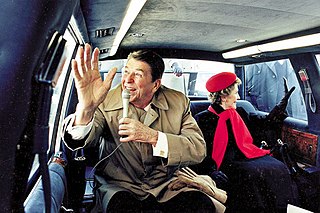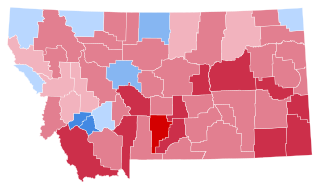| |||||||||||||||||
| |||||||||||||||||
| |||||||||||||||||
The 1966 California lieutenant gubernatorial election was held on November 8, 1966. Republican nominee Robert Finch defeated Democratic incumbent Glenn M. Anderson with 59.79% of the vote.
| |||||||||||||||||
| |||||||||||||||||
| |||||||||||||||||
| Elections in California |
|---|
 |
The 1966 California lieutenant gubernatorial election was held on November 8, 1966. Republican nominee Robert Finch defeated Democratic incumbent Glenn M. Anderson with 59.79% of the vote.
| Party | Candidate | Votes | % | ±% | |
|---|---|---|---|---|---|
| Republican | Robert Finch | 3,834,978 | 59.79% | +11.21% | |
| Democratic | Glenn M. Anderson (incumbent) | 2,578,887 | 40.21% | -11.21% | |
| Majority | 1,256,091 | ||||
| Turnout | |||||
| Republican gain from Democratic | Swing | ||||

The 1984 United States presidential election was the 50th quadrennial presidential election, held on Tuesday, November 6, 1984. Incumbent Republican President Ronald Reagan and his running mate, incumbent Vice President George H.W. Bush, were re-elected to a second term in a landslide. They defeated the Democratic ticket of former Vice President Walter Mondale and Geraldine Ferraro.

Robert Hutchinson Finch was a Republican politician from La Canada Flintridge, California. In 1967, he served as the 38th Lieutenant Governor of California. Following Richard Nixon's presidential campaign in 1968, he was appointed Secretary of Health, Education, and Welfare in 1969. He was the Counselor to the President from 1970 until 1972. During the 1976 California United States Senate election, he lost in the Republican primary to S.I. Hayakawa.

The 1970 United States Senate elections was an election for the United States Senate. It took place on November 3, with the 33 seats of Class 1 contested in regular elections. Special elections were also held to fill vacancies. These races occurred in the middle of Richard Nixon's first term as president. The Democrats lost a net of three seats, while the Republicans and the Conservative Party of New York picked up one net seat each, and former Democrat Harry F. Byrd Jr. was re-elected as an independent.

The 1964 United States Senate elections were held on November 3. The 33 seats of Class 1 were contested in regular elections. Special elections were also held to fill vacancies. They coincided with the election of President Lyndon B. Johnson by an overwhelming majority, to a full term. His Democratic Party picked up a net two seats from the Republicans. As of 2023, this was the last time either party has had a two-thirds majority in the Senate, which allowed the Senate Democrats to override a veto, propose constitutional amendments, or convict and expel certain officials without any votes from Senate Republicans. However, internal divisions would have prevented the Democrats from having done so. The Senate election cycle coincided with Democratic gains in the House in the same year.

The 1966 United States House of Representatives elections was an election for the United States House of Representatives on November 8, 1966, to elect members to serve in the 90th United States Congress. They occurred in the middle of President Lyndon B. Johnson's second term. As the Vietnam War continued to escalate and race riots exploded in cities across the country, Johnson's popularity had fallen, and the opposition Republican Party was able to gain a net of 47 seats from Johnson's Democratic Party, which nonetheless maintained a clear majority in the House. This was also the first election that occurred after the Voting Rights Act of 1965 became law, the first time since 1870 that a Republican won a House seat in Arkansas, and the first since 1876 that the party did so in South Carolina.

John Crepps Wickliffe Beckham was an American attorney and politician who served as the 35th governor of Kentucky and a United States senator from Kentucky. He was the state's first popularly-elected senator after the passage of the Seventeenth Amendment.

The 1966 California gubernatorial election was held on November 8, 1966. Incumbent Democratic Governor Pat Brown was defeated in his bid for re-election by Republican nominee and future President Ronald Reagan. As of the 2022 gubernatorial election, this is the last time an incumbent governor of California lost re-election, though one subsequent incumbent governor was recalled.

Glenn Malcolm Anderson was an American politician. He was the 37th Lieutenant Governor of California and later represented Southern Los Angeles County in the U.S. House of Representatives. He was a member of the Democratic Party.
California's 1st congressional district is a U.S. congressional district in California. Doug LaMalfa, a Republican, has represented the district since January 2013. Currently, it encompasses the northeastern part of the state. Since the 2022 election, it includes the counties of Butte, Colusa, Glenn, Lassen, Modoc, Shasta, Siskiyou, Sutter, and Tehama, and most of Yuba County. The largest cities in the district are Chico, Redding, and Yuba City.

The 1962 California gubernatorial election was held on November 6, 1962. The Democratic incumbent, Pat Brown, ran for re-election against former U.S. vice president and 1960 Republican presidential nominee Richard Nixon. In his concession speech the following morning, Nixon accused the media of favoring his opponent Brown, stating that it was his "last press conference" and "You won't have Nixon to kick around any more." Six years later, Nixon was elected President of the United States, and exactly ten years after this press conference he was re-elected in a landslide.

The 1958 California gubernatorial election was held on Tuesday November 4, Democratic candidate Pat Brown won the first of his two terms as governor of California against Republican senator William Knowland.

Cecil Rhodes King was an American businessman and politician. King, a Democrat, served as the first member of the United States House of Representatives from California's 17th congressional district for fourteen terms, serving from August 1942 to January 1969. King was first elected by special election on August 25, 1942, after previously serving out the term of Lee E. Geyer who had died in Washington, D.C., on October 11, 1941.

From January 21 to June 3, 1980, voters of the Democratic Party chose its nominee for president in the 1980 United States presidential election. Incumbent President Jimmy Carter was again selected as the nominee through a series of primary elections and caucuses, culminating in the 1980 Democratic National Convention, held from August 11 to 14, 1980, in New York City.

This is the electoral history of Ronald Reagan. Reagan, a Republican, served as the 40th president of the United States (1981–1989) and earlier as the 33rd governor of California (1967–1975). At 69 years, 349 days of age at the time of his first inauguration, Reagan was the oldest person to assume the presidency in the nation's history, until Donald Trump was inaugurated in 2017 at the age of 70 years, 220 days. In 1984, Reagan won re-election at the age of 73 years, 274 days, and was the oldest person to win a US presidential election until Joe Biden won the 2020 United States presidential election at the age of 77 years, 349 days.

The 2008 South Carolina Senate election were held on Tuesday, November 4, 2008. The primary elections were held on June 10 and the runoff elections were held two weeks later on June 24. The current composition of the state delegation is 27 Republicans and 19 Democrats. Senators are elected for four-year terms, all in the same year.

The 1968 United States presidential election in Montana took place on November 5, 1968, and was part of the 1968 United States presidential election. Voters chose four representatives, or electors to the Electoral College, who voted for president and vice president.

The 1966 United States Senate election in Kansas took place on November 8, 1966, concurrently with elections to the United States Senate in other states as well as elections to the United States House of Representatives and various state and local elections.

The 1904 North Carolina gubernatorial election was held on November 8, 1904. Democratic nominee Robert Broadnax Glenn defeated Republican nominee Charles J. Harris with 61.72% of the vote. At the time, Glenn was an attorney and former member of the state Senate, while Harris was a businessman and former member of the United States Industrial Commission.

The 1962 California lieutenant gubernatorial election was held on November 6, 1962. Democratic incumbent Glenn M. Anderson narrowly defeated Republican nominee George Christopher with 51.42% of the vote.

The 1958 California lieutenant gubernatorial election was held on November 4, 1958. Democratic nominee Glenn M. Anderson narrowly defeated incumbent Republican Harold J. Powers with 50.87% of the vote.